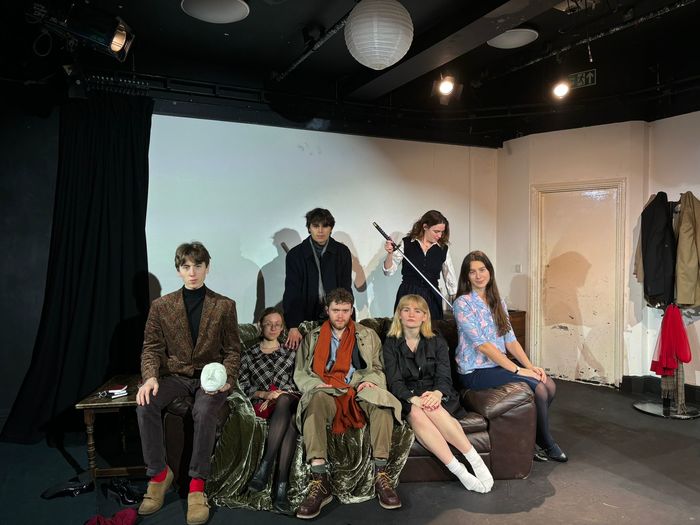Lady Windermere’s Fan: a vibrant cross-cultural ball with some missteps
This year’s BME Marlowe is a cause for celebration despite some rough patches

The inaugural BME Marlowe – rechristened from previous years’ BME Shakespeare to expand its cultural repertoire – takes on a Wildean classic in Lady Windermere’s Fan. Under the direction of Aditi Rai Sia Mei Ann, the production sets out to merge comedy, drama and social critique – and lands somewhere between the realm of awkward giggles and thought-provoking reflection amongst the audience.
Set over two scandal-packed days in Victorian London, we follow Lady Windermere (Elizabeth Peni Brooks) as she discovers that her husband (Rob Monteiro) has been paying large sums to a Mrs Erlynne (Emma Dawes), who is notorious among society. Gossip swirls and, despite Lord Windermere’s protestations of innocence, Lady Windermere buys into society’s whispers and assumes he is having an affair.
The drama of the first two acts peaks at Lady Windermere’s birthday party, to which her husband decides to invite his would-be ‘mistress’. At this point, the direction of the stage was more clunky than not. The pace felt somewhat forced and the disjointed transitions between comedy, drama and scandal meant there was an awkward disconnect between scenes.
“There was an awkward disconnect between scenes”
Thankfully, the second half fully picks up steam. Dawes’s commanding monologue towards the play’s conclusion delves into Wilde’s recurring themes of love, marriage, age, and the costliness of mistakes. She succeeds by injecting an emotional complexity that the first half of the production lacks, carefully balancing vulnerability with pride.
One of the best choices in this production is its casting and cultural reinterpretation. A vibrant, diverse set of actors brings, as promised by the director, a fresh energy to Wilde’s work. The dinner party scene in particular is a memorable tableau of kaleidoscopic cultural attire, and the representation of different accents, and music in different languages, adds more layers to this multicultural dynamic.
Though some performances were definitely stronger than others, making for a mixed bag overall, when the acting works it really works. Brooks embodies the titular role with a delicate balance of innocence and stubborn conviction, toeing the line between victimhood and self-destruction in moments such as her monologue at Lord Darlington’s (Brian Joseph). Monteiro offers a layered performance as Lord Windermere, both in his subtle facial expressions and grand gestures, navigating a fraught tension between loyalty and secrecy.
“Some performances were definitely stronger than others, making for a mixed bag overall”
Dawes is an electric presence – confident, manipulative, yet deeply human. The real chaos unravels when Lady Windermere’s fan (left behind at Lord Darlington’s) threatens to expose how she nearly ran away with him. Mrs Erlynne, in an act of preservation (or perhaps self-interest) claims it as her own, keeping Lady Windermere’s secret intact. It’s at this moment that our perception of Erlynne shifts from a scandalous outsider to a complicated woman navigating society’s expectations. Dawes’s carefully controlled tone, oscillating between sincerity and sarcasm, leaves us wondering whether she’s finally worth sympathising with at the end – or if she’s still a conniving social schemer at heart.
On the comedic end, supporting turns from the Duchess of Berwick (Samira Tahlil) and Lord Augustus (Akshit Ahuja) – who embodies the contradictions of a gossip-loving moralist with perfect comedic timing – were well-executed and offered the audience real thigh-slapping humour in a pair of loveable fools. Joseph’s somewhat monotone delivery as Darlington, whether intentional or not, adds a comedic layer especially to the opening scenes.
This all builds up to a finale whose big reveal – that Erlynne is Lady Windermere’s long-lost mother – can’t help but fall flat. Possibly, since it was hinted at throughout the first acts, which were somewhat less than satisfying, what should have been a significant moment is brushed over, rendering it strangely anticlimactic. That’s not to say the production didn’t do justice to Wilde’s critique of reputation and hypocrisy. The entire plot convincingly hinges on secrets – who keeps them, who reveals them, and who suffers when they’re exposed. In the end, it is not the truth but silence that maintains order; the titular fan thus serves as a symbol of trust, and the fragility of society’s ideals.
This production shines best in moments of bold interpretation, dynamic character work and vibrant multicultural dress. It’s to its detriment that it stumbles over uneven performances and missed opportunities for emotional impact. By the second half it fully embraces the contradictions of Wilde’s world, where morality is negotiable, appearances are everything, and redemption is, at best, partial. Ultimately, the Marlowe Society gives us a quirky, ambitious take on a classic. And in the end, isn’t that what Wilde would’ve wanted?
‘BME Marlowe 2025: Lady Windermere’s Fan’ is showing at the ADC Theatre from Tuesday 18 until Saturday 22 February, at 7:45pm, including a Saturday matinee at 2:30pm.
Want to share your thoughts on this article? Send us a letter to letters@varsity.co.uk or by using this form.
 News / Candidates clash over Chancellorship25 April 2025
News / Candidates clash over Chancellorship25 April 2025 News / Cambridge professor paid over $1 million for FBI intel since 199125 April 2025
News / Cambridge professor paid over $1 million for FBI intel since 199125 April 2025 Interviews / Dr Ally Louks on going viral for all the wrong reasons25 April 2025
Interviews / Dr Ally Louks on going viral for all the wrong reasons25 April 2025 Comment / Cambridge students are too opinionated 21 April 2025
Comment / Cambridge students are too opinionated 21 April 2025 News / Zero students expelled for sexual misconduct in 2024 25 April 2025
News / Zero students expelled for sexual misconduct in 2024 25 April 2025






